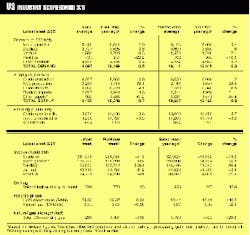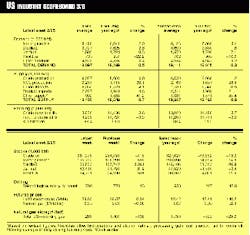OGJ Newsletter
One might not know it to look at Wall Street's blasé attitude toward petroleum these days, but opportunities abound for investors in oil stocks.
Even as oil prices approach decade highs, foremost on the minds of many oil and gas firms as of late is the market's undervaluation of E&P stocks. In its coverage of 13 large-cap E&P companies, Lehman Bros. says those shares are unappreciated in a market hungry for gains through high-tech stocks.
"We believe that oil and gas exploration and production company shares are very inexpensive at current valuation levels," the analyst said. "Natural gas production has fallen sharply over the past year, and we believe that strong storage refill demand over the summer will combine with sharply lower gas supply to lead to strong gas prices.
"The current oil price strength is not reflected in the share prices, as investorsellipseremain skeptical that the high oil prices will be sustained," said Lehman Bros. As a result-after assuming a decline in oil prices to an average $19/bbl for 2001-shares are trading far below historic multiples of forward cash flows, it says, which leads to an average appreciation of share price of 55-60%.
Depressed share prices are slowing merger and acquisition activity in Canada's petroleum industry.
M&A action in Canada's oil sector fell by 55% in 1999 vs. 1998, says Sayer Securities Ltd. Sayer says E&P companies completed deals worth $11.1 billion (Can.) in 1999 vs. $24.9 billion in 1998. Five major mergers in 1998-worth $6.5 billion-boosted the annual total to a record level. Sayer says low share prices for many oil companies in 1999 were a major cause of the drop in M&A activity.
Nevertheless, there is a scramble outside North America among former and current state firms to leverage their equity on stock markets.
Russian majors continue to take steps to integrate themselves into world markets (see story, p. 25, and OGJ, Feb. 28, 2000, pp. 23 and 28).
Yukos Chairman Mikhail Khodorkovsky last week unveiled a series of measures to bolster operating efficiency, trim cost of capital, and boost shareholder value of Russia's second biggest oil company. Included are plans to pay shareholders dividends totaling about $100 million, based on expected pretax cash flow of $600 million in 1999; list shares on the Moscow Interbank Currency Exchange to enable open trading and greater share liquidity; restructure the Yukos board to increase input from technology specialists and representatives from regions in which the firm operates; and consolidate ownership of Yukos's production and refining subsidiaries into the parent.
Sinopec (China National Petrochemical Corp.) has established a holding company in preparation for listing on overseas equity markets. The vehicle for the initial public offering is called China Petroleum & Chemical Corp., or Sinopec Corp. With 68.8 billion yuan in fixed assets, Sinopec Corp. will remain China's second largest oil firm after China National Petroleum Corp. (now known as PetroChina) and will concentrate its efforts mainly in oil refining, petrochemicals, and oil and gas production.
Sinopec Corp. holds major stakes in 11 of China National Petrochemical's units, which have already listed their shares in Hong Kong, Shenzhen, and Shanghai. It aims to float shares on the Hong Kong and New York exchanges in the second or third quarter of this year, looking to raise up to 40 billion yuan.
Meanwhile, a spokesman for Taiwan's Chinese Petroleum Corp. says the company's planned privatization may be delayed by up to a year as a result of the failure of Taiwan's legislature to enact laws enabling the state firm to begin selling shares to the private sector in September, as originally planned. The plan called for CPC to be privatized by June 2001, but sources in Taipei say that, even if the legislature enacts the required laws in its current session, it is unlikely privatization can be carried out before late 2002.
Through a partnership being billed as "one of the world's largest integrated energy initiatives," UAE Offsets Group (UOG) has inked a project development agreement with Enron and TotalFina unit Elf to implement UOG's Dolphin initiative-a proposed 10 billion-euro infrastructure of gas supply projects and gas-related industrial schemes to be developed along the southern Persian Gulf (OGJ, July 19, 1999, p. 28). UOG is to hold 51% of the partnership, with Elf and Enron each holding 24.5%.
UOG Chairman Amin Badr el Din said, "The creation of the partnership launches the world-class entity required to implement the Dolphin vision." In fact, UOG has signed seven deals to deliver Qatari gas to Dubai and then to Oman in the past 11 months. Through a partnership expected to last 25 years, Elf will focus mainly on upstream project development while Enron is to concentrate on pipeline development, gas marketing, and project risk management.
The first phase of the initiative is to take 2-3 years to complete.
And while getting a toehold in the Middle Eastern market, Enron continues its promotion of the 2,184-Mw Dabhol power project near Ratnagiri in southern Maharashtra, India, and intends to pump $150 million of investments into Enron Energy Marketing Ltd., a company being created to import and market LNG. Approval is being sought from India's Foreign Investment Promotion Board to float the new company, which is to tackle financing hurdles Enron faces in executing its LNG plans and Dabhol project.
Peru has once again postponed the tender for the Camisea gas and liquids transport and distribution concessions, slated Mar. 6-9 (OGJ, Feb. 14, 2000, Newsletter). Jorge Chamot, minister of energy and mines, said that potential bidders asked for more time to assemble a consortium. He added that they also wanted to obtain more details on the development of the project.
A consortium of Argentina's Pluspetrol, US-based Hunt Oil, and South Korea's SK Corp. won the contract to exploit the Camisea fields Feb. 16 (OGJ, Feb. 21, 2000, p. 26). The minister said that the group has until Aug. 1 to present its program for project development. The consortium is also entitled to hold up to 20% of the concessions for the pipelines.
The Camisea committee has not set a new date for the tender of the pipeline concessions, but the minister said that it could be in late April-after the general elections Apr. 9. The definitive contracts for both stages are to be signed by late May or the beginning of June. Chamot said companies discussing a consortium for the transport and distribution concessions include Argentina's Techint, Enron, Spain's Gas Natural, Japan's Mitsui, and Colombia's Promigas.
Social strife continues to compromise Colombia's oil sector and environment, as 3,500 bbl of oil were released Feb. 18 from the country's Southern Andean Pipeline. Protestors had taken control of state oil firm Ecopetrol's Guayacana pressure-reduction station about 20 km from Tumaco Bay, on the Pacific Coast near Ecuador. While guerrilla attacks on oil pipelines are routine in Colombia, actions of this nature are not.
The oil entered the Rosario River upstream of a protected mangrove swamp. On Feb. 22, Ecopetrol's Southern Management Contingency Plan, the Ministry of the Interior, and local environmental authorities moved into the zone to take spill-control measures. Their efforts were delayed by civilian groups, consisting of school teachers and fishermen, which had blocked access to the station where they reportedly manipulated a release valve. Local and national authorities negotiated with the protestors and finally ended the blockade Feb. 24.
While the teachers were seeking unpaid salaries, the fishermen demanded compensation for a 1998 spill from an Ecuadorian tanker in Colombian waters, which has affected their activities. The Colombian military has hinted at involvement by the ELN guerrilla group in the incident.
In what can be considered a serious blow to Japan-a country that imports 99.7% of its oil and considers energy supply a national security problem-Arabian Oil Co. (AOC), Japan's largest oil supplier, lost its drilling rights in Saudi Arabia after talks between the consortium of Japanese firms and Riyadh collapsed. Negotiations centered on rights AOC has held nearly 4 decades in Khafji oil field, off the Neutral Zone between Saudi Arabia and Kuwait. AOC pumps 300,000 b/d of oil from Khafji; Saudi Arabia and Kuwait each receive 11% of revenues and AOC retains the remainder.
Immediately after the oil concession expired, AOC Pres. Keiichi Konaga said a Saudi Aramco subsidiary would be given rights to operate Khafji and there would be no more talks between AOC and the Saudis on the concession. Further attempts by Konaga to broker a last-minute compromise failed. Japan is feeling particularly sensitive about energy issues following the recent rise in oil prices. Some Japanese officials fear the breakdown in talks will damage Saudi-Japanese relations. The development will also have a severe impact on AOC, which relies on Khafji for about half of its supplies.

